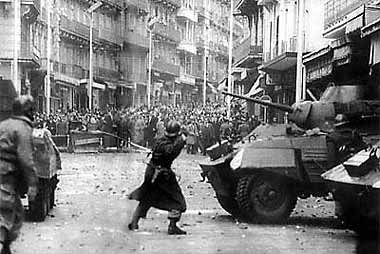 |
Peoples' movements and protests |
 |
|
MobilizationsLatin American wars of independenceNorth American war of independenceSlave uprising in HaitiIrish nationalism and Sinn FéinRussian revolutionIndia independence movementChinese revolutionAlgerian war of independencePalestinian movementVietnam warBreton movementBasque movementNorwegian opposition to EUTo National movementsTo main page |
The Algerian War of Independence
Algeria was conquered by France between about 1830 and 1850. The resistance was organized by Sufi fraternities, but they were defeated. Then the French state confiscated the best land and distributed it to European settlers. The Algerians were allowed to remain as peasants in the leaner parts of the country and otherwise become workers. Algeria was declared ”part of France” but the slightest attempt to extend French citizenship to Algeria was stopped by the settler colonists. The Algerian resistance was conducted mainly in religious forms, as a puritanical revival movement in the 20s and 40s, and as a movement for the Algerian workers in France. In the first place, the goal was either culturally and socially or, insofar as it was political, aimed at obtaining civil rights in France. Algeria participated in the French armies in World War II and Algeria celebrated the victory against Nazism. The celebration in Setif turned to demanding civil rights, equally for Muslims and Christians, and turned into a popular uprising that was crushed. To alleviate the fate of the Algerians, various Social Democratic governments in France tried to some extent to extend civil rights – one-ninth voting rights to Muslims – but due to opposition from the settler colonists, the proposal had to be withdrawn. In 1954, some ex-soldiers in the French army had enough and aimed an armed attack on a dozen places across Algeria. Most things went wrong and the people in general did not notice anything, but the authorities panicked and arrested every Algerian who had ever expressed any political opinion at all, and in prison the Algerians agreed on continued armed resistance and the FLN – Front de Liberation National – was formed. This resistance was carried on for seven years, in the form of needle-stick operations here and there, and in the attempts to crack down on it the French army turned the whole of Algeria into a battlefield. It is estimated that about half a million Algerians were murdered. The military significance of the FLN’s actions was small, but eventually the FLN emerged as the only existing political force among the Muslims – the French, and not least the terrorist groups of the settler colonists, had killed everyone else – and when the French had had enough of the massacre, the French government had to settle with FLN. As the decisive event, one usually mentions a giant demo when De Gaulle visited Algiers in 1960, when the entire Muslim quarter waved FLN flags. As independents, the heirs of the FLN had been quite happy to sell oil to the Europeans, and not bothered much about developing their country. Which has lead to huge unemployment, emigration and in the 80s and 90s the flowering of an Islamist opposition. Reading
|
